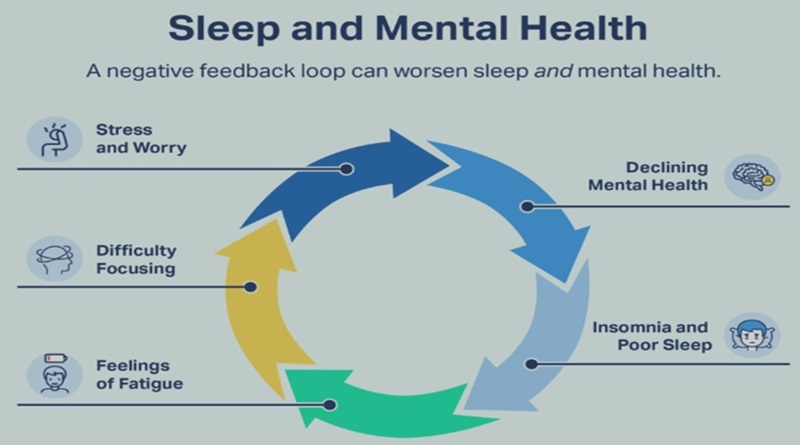The Impact of Sleep on Mental Health

Delhi: In our fast-paced world, sleep is often sacrificed in the pursuit of productivity. However, the importance of a good night’s sleep goes beyond banishing grogginess – it plays a critical role in mental health. Research consistently highlights the profound impact of sleep on cognitive function, emotional well-being, and overall mental health.
Cognitive Function:
Adequate sleep is essential for optimal cognitive function. During sleep, the brain undergoes crucial processes such as memory consolidation and neural rejuvenation. Insufficient sleep disrupts these processes, leading to difficulties in concentration, memory recall, and decision-making. Chronic sleep deprivation has been linked to an increased risk of neurodegenerative conditions, emphasizing the long-term consequences of neglecting sleep.
Emotional Well-being:
The relationship between sleep and emotions is bidirectional. Sleep influences emotional regulation, and emotions, in turn, affect sleep patterns. Sleep deprivation can heighten emotional reactivity, leading to increased irritability, anxiety, and mood swings. Moreover, individuals with chronic sleep problems are more susceptible to developing mental health disorders such as depression and anxiety.
Stress Response:
Quality sleep acts as a natural stress buffer. When we sleep, stress hormones are regulated, and the body undergoes repair processes necessary for maintaining balance. Inadequate sleep disrupts this delicate balance, leaving individuals more vulnerable to the detrimental effects of stress. Chronic stress, if left unmanaged, can contribute to the development of various mental health issues.
Tips for Improving Sleep and Mental Health:
- Establish a Consistent Sleep Schedule: Going to bed and waking up at the same time every day helps regulate the body’s internal clock, promoting better sleep.
- Create a Relaxing Bedtime Routine: Engage in calming activities before bedtime, such as reading or practicing relaxation techniques, to signal to your body that it’s time to wind down.
- Limit Screen Time Before Bed: The blue light emitted by screens can interfere with the production of the sleep hormone melatonin. Aim to reduce screen time at least an hour before bedtime.
- Optimize Sleep Environment: Create a comfortable and dark sleeping environment, maintaining a cool room temperature for optimal sleep quality.
- Seek Professional Help if Needed: Persistent sleep issues or signs of mental health concerns should prompt consultation with healthcare professionals. They can provide guidance and support tailored to individual needs.
In conclusion, prioritizing sleep is not just a luxury but a necessity for maintaining good mental health. By recognizing the interconnectedness of sleep and mental well-being, individuals can make informed choices to foster a healthier, more resilient mind.






Pingback: Sweden Urges Screen Ban for Kids Under 2: Expert Warning - fnnnews
Pingback: Simpleplay
Pingback: 꽁포
Pingback: wing888
Pingback: สื่อการสอนฟรี
Pingback: Engineering
Pingback: safe escape from tarkov exploits
Pingback: เว็บแทงบอล ufabet มีอะไรให้เล่นบ้าง
Pingback: วิธีเล่นสล็อต Caishen Wins ออนไลน์
Pingback: ทัวร์เวียดนาม
Pingback: สล็อตออนไลน์ เว็บตรงไม่ผ่านเอเย่นต์
Pingback: ฟิลเลอร์
Pingback: my cam
Pingback: เช่ารถตู้พร้อมคนขับ
I must point out my respect for your generosity in support of women who actually need assistance with the study. Your special dedication to passing the solution across appears to be astonishingly good and has made some individuals much like me to achieve their targets. The useful help denotes much to me and substantially more to my office workers. Thanks a ton; from all of us.
Pingback: игра авиатор
Good V I should certainly pronounce, impressed with your website. I had no trouble navigating through all the tabs as well as related info ended up being truly simple to do to access. I recently found what I hoped for before you know it at all. Reasonably unusual. Is likely to appreciate it for those who add forums or something, website theme . a tones way for your customer to communicate. Nice task..